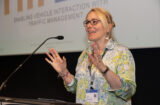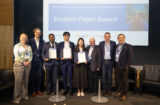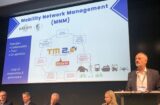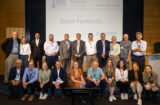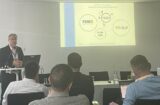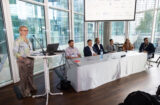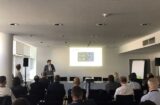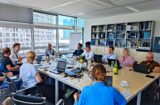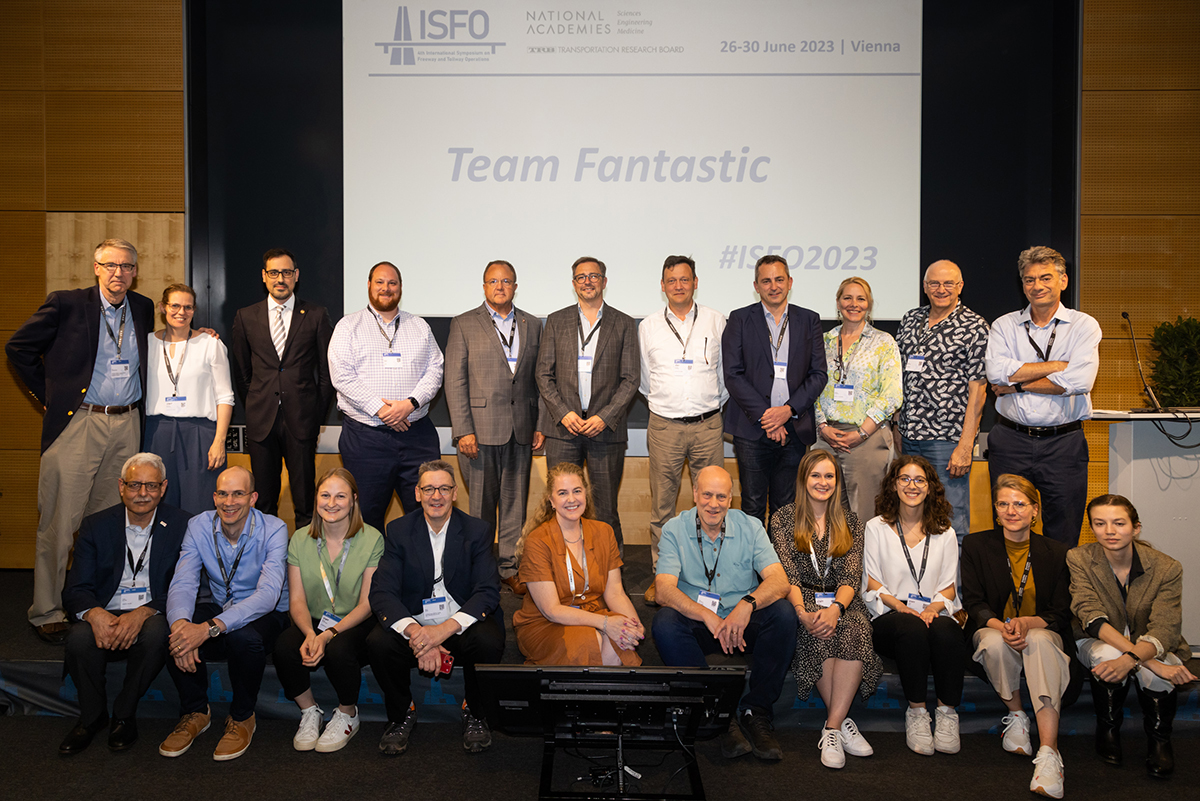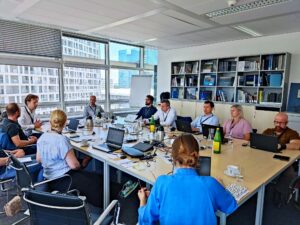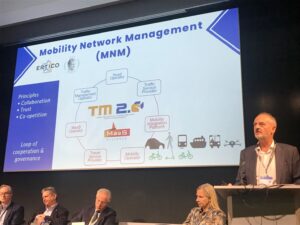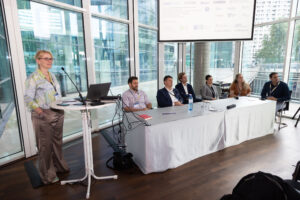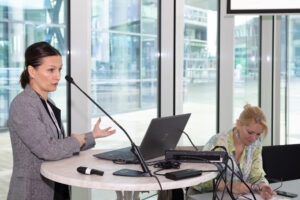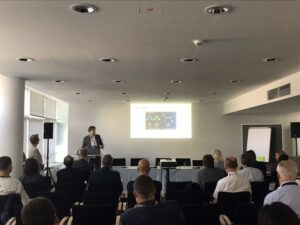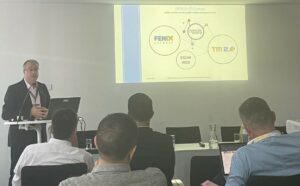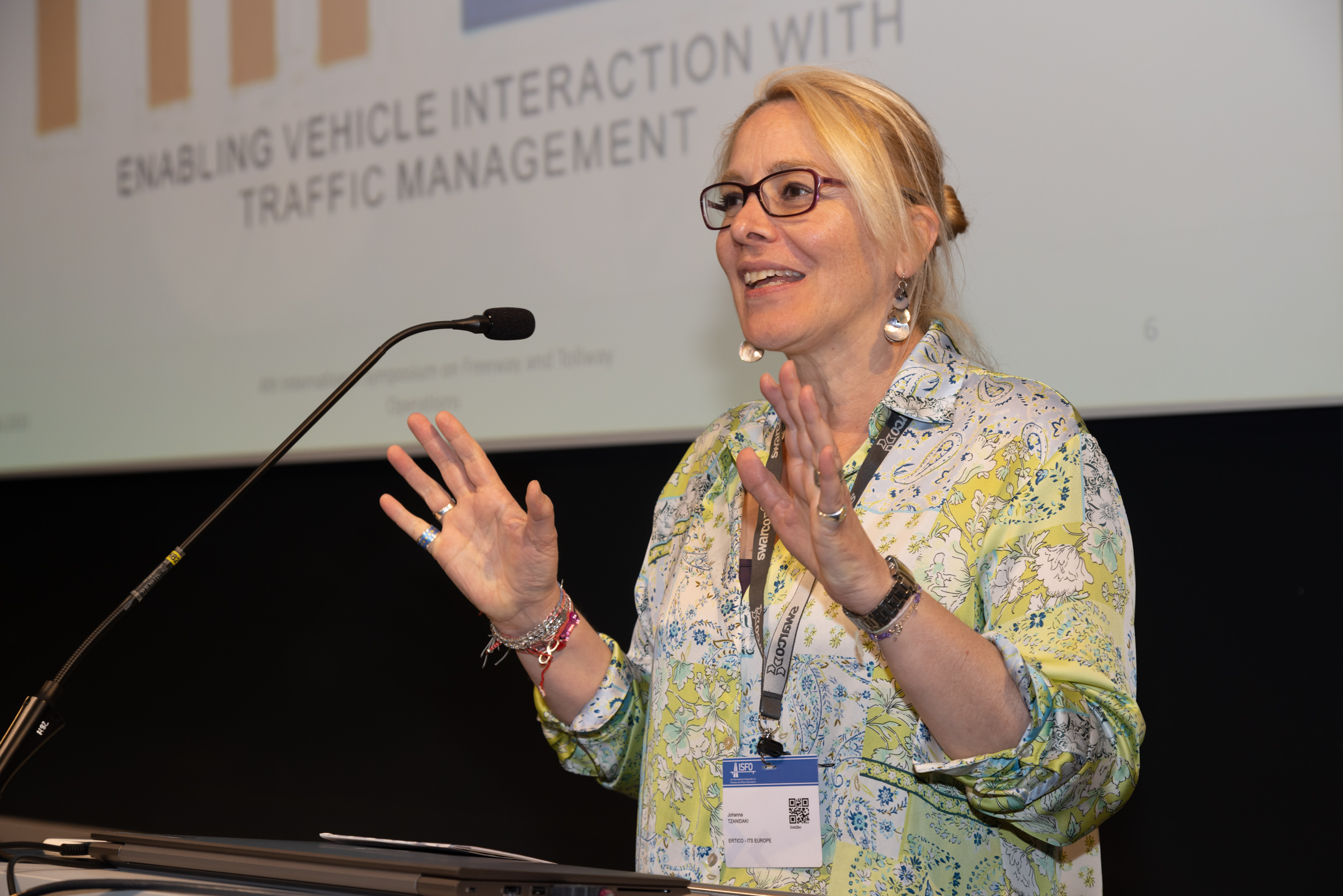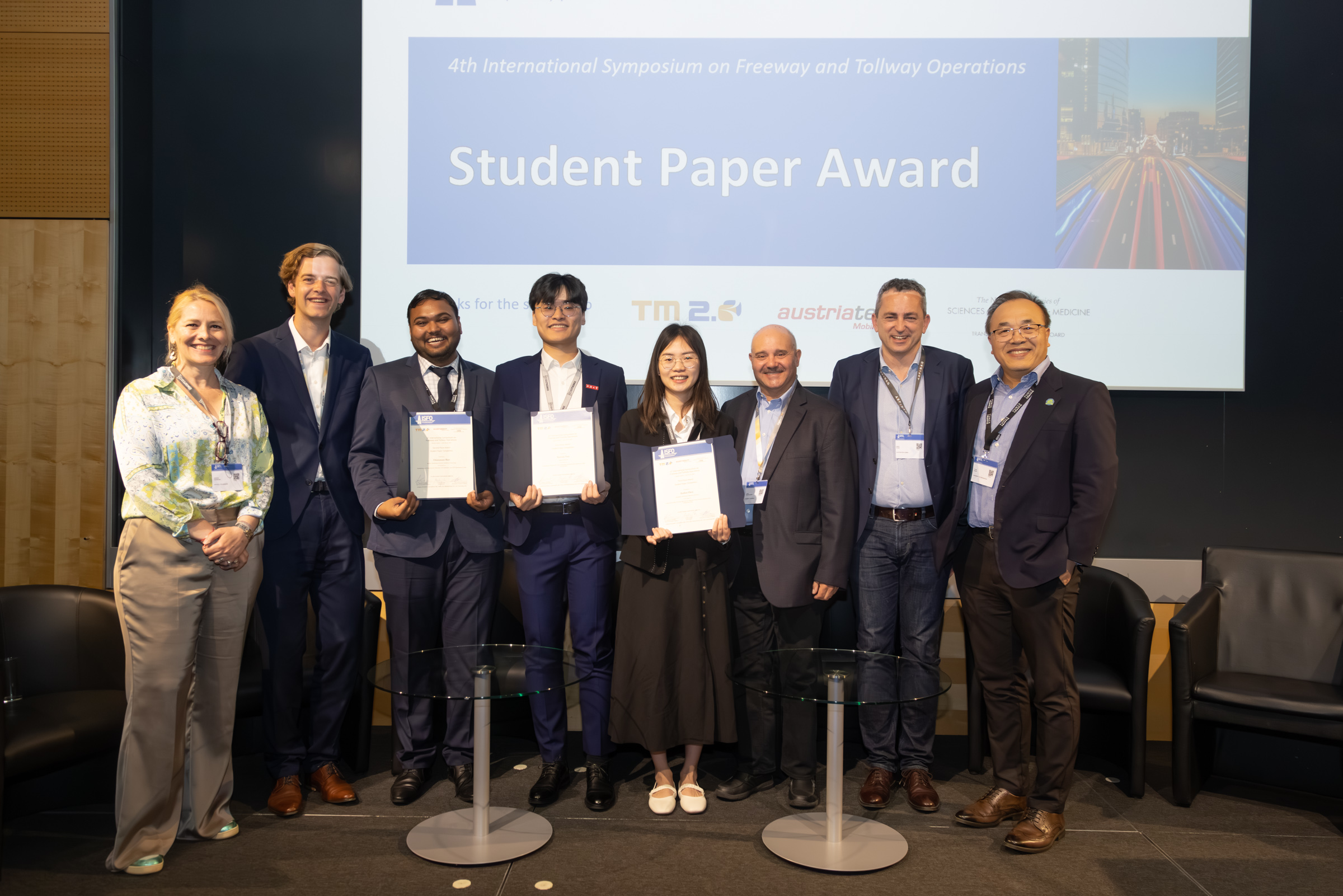- TM2.0
- TM2.0 Task Forces
- News
- Events
- Blog
- Library
- Members
- Contact Us
TM 2.0 and ERTICO shape the future of traffic management at the ISFO Symposium 2023
The 4th edition of the International Symposium on Freeway and Tollway Operations (ISFO) took place in Vienna from 26 to 30 June focusing on the Future of Traffic Management. Organised by the Transportation Research Board (TRB) and AustriaTech with the active support of the ERTICO Innovation Platform TM 2.0, this highly anticipated event brought together close to 400 international Traffic management experts from the US DoTs and European Industry and public sectors to discuss and explore innovation advances in Traffic Management. More than 40 sessions and workshops took place at ISFO. TM 2.0’s contribution to the discussions and knowledge exchange on more efficient and sustainable traffic management was widely acknowledged.
Focusing on four main themes – Governance and Organizational Challenges, Managing and Analyzing Operational Strategies and Performance, Next Generation Traffic Management Systems and Services, and Innovative Financing to Build and Operate Motorways – the ISFO Symposium hosted the Traffic Management communities from the US and Europe who engaged in insightful debates and exchanges exploring novel approaches and practices in traffic operations in the two continents.
As the leading ERTICO Innovation Platform on interactive traffic management, TM 2.0 was intensely involved in the organisation of the event. For almost two years, ERTICO Chief Innovation Officer and TM 2.0 co-Chair, Dr Johanna Tzanidaki, and Martin Russ, Managing Director of AustriaTech, a leading member of the TM 2.0 Platform, have been working side by side with Jon Obenberger (US Federal Highway Administration), who leads the TRB ITS Committee, and with TRB colleagues on developing the programme of this leading event and making sure the topics of the Sessions and Workshops addressed at ISFO drive forward the key issues in the sector. Through the participation of a considerable number of TM 2.0 members and friends, including Jop Spoelstra (Technolution), Annet Van Veenendaal and Marjolein Masclee (NDW/RWS), Jeroen Brower and Kristina Vuletic (TomTom), Fabrizio Paoletti (Autostrade per l’Italia), Pedro Barradas (ARMIS ITS), Itir Coskun, Gino Franco and Steve Penn (SWARCO), Holger Erhardt and Markus Racz (Yunex Traffic), Susanne Schulz (Die Autobahn), Christian Klein and Christopher Hochmuth (HERE Technologies), Tomi Laine (Traficon), Martin Pichl (Czech Ministry of Transportation), Patrick Hofman (Gemeente Helmond), Menno Malta (Monotch), Estibaliz Baranano, Michael Weber, Jeffrey Adler and Justin Hamilton (KAPSCH TrafficCom), Susanna Zammataro and Gonzalo Alcaraz (IRF Geneva), Gerd Nees (Be-Mobile), Norbert Consulting (GNNS Consulting), Nick Cohn (Consultant), Manfred Harrer, Christoph Antony, David Kollenhofer, Martin Nemec and Bernd Datler (ASFINAG), Malika Seddi (ASECAP), Dr Karim Hesham Tarraf (Hawa Dawa/Bernard Group), Dr Dimitris Kourtesis (Ideas Forward), Sascha Westermann (Fujitsu), Vassiliki Mylona (Road Safety Institute Panos Mylonas), Angelos Bekiaris (CERTH), and Wolfgang Ponweiser (AIT/ECTRI). TM 2.0 had a very strong presence at the Symposium contributing to a great number of workshops and plenary sessions, in addition to the General Assembly meeting of the platform organised as a side event at the Symposium.
The Chairman of the ERTICO Supervisory Board, Dr Angelos Amditis (ICCS) presented the ERTICO vision and innovation in Traffic management and the concept of TM 2.0 on coopetition and trust among traffic management stakeholders with a keynote speech during the third Plenary at ISFO. He took part in the interesting panel debate on improving the value proposition of Traffic Management where Tiffany Vlemmings discussed the priorities and initiatives on behalf of the European Commission (DG MOVE) and Georg Kapsch (Kapsch TraffiCom) made interesting statements on prioritising sustainability over efficiency in traffic management. In his keynote speech, Dr Angelos Amditis highlighted how traffic management creates valuable impact and value through collaboration and data sharing to achieve more inclusive and sustainable mobility and how nowadays cities consciously opt for lower speed for vehicles on the road and multimodality with regards to mobility.
Furthermore, a number of Workshops were organised, moderated and supported by TM 2.0 and ERTICO: Workshop 17 on “Traffic Management and Climate Neutrality”, organised and moderated by Dr Johanna Tzanidaki and in which Dr Tamara Djukic, ERTICO Senior Manager in Innovation and Deployment, contributed as a panellist, discussed climate targets integration in traffic management and current measures and solutions on the market and fostered an important exchange of best practices in Europe and the US. Dr Tamara Djukic also had the opportunity to share her expertise on traffic modelling and predictions during Workshop 3, which discussed the latest developments linked to the definition and evaluation of traffic management KPIs that incorporate sustainability considerations. The panel offered interesting perspectives on the need for common approaches and reliable data.
Vladimir Vorotovic, Innovation and Deployment Director at ERTICO, represented TM 2.0 and ERTICO in the panels of two different workshops, in which he shared good practices and insights from TM 2.0: in Workshop 12 the debate centered around emergency traffic management in situations inked to severe weather, natural disasters and major planned events, such as Olympic Games while in Workshop 5 the concept of “slot management” in road and freight transport and the feasibility of technological advancements in both road infrastructures and vehicles through various use cases were analysed.
In Workshop 13 on ‘Urban Vehicle Access Regulations — a Key Tool for Future Traffic Management’ ERTICO Senior Manager in Innovation and Deployment Coen Bresser discussed the work of the Expert Group on Urban Mobility (EGUM) subgroup on UVAR and how ERTICO addresses this topic in its innovation work. In addition, Dr Johanna Tzanidaki and Dr Tamara Djukic also made valuable contributions to Workshops 4 on Integrated Mobility Management, discussing the game-changer concept of TM 2.0 and highlighting the shift from managing the volumes of the vehicles to managing the mobility of travellers and goods and how such practices necessitate a high quality of offered ITS services.
The value of the TM 2.0 concept was discussed and presented to the audience in a number of Sessions and the work carried out by the platform towards advancing interactive traffic management and establishing the organisational and operational basis for the Mobility Network Management was taken as one of the points to be further explored between the US DoTs of TRB and the European Traffic community at ISFO. The final Plenary, in which Dr Johanna Tzanidaki contributed as a panellist, agreed that further cooperation between the two communities in terms of research projects and pilots under not only federal US and EU funding schemes but also state and national funding lines, will have to support innovation that benefits all users and stakeholders from both the private and public sector.
The successful Symposium on Traffic Management was concluded with the TM 2.0 sponsored Student Paper Awards which were handed out to three winners for their innovative papers in the field: Xuerun Yan (Tongji University, China), Chintaman Bari (Sardar Vallabhbhai National Institute of Technology, India), and Junlan Chen (Monash University, Australia). The 3 Students received a monetary award in addition to the coverage of their expenses to travel and attend ISFO. “It is very important for our Traffic Management communities around the globe to physically meet in order to discuss and exchange best practices on innovation and research. With these Student Paper Awards, the TM 2.0 ERTICO Innovation Platform was able to offer support and recognition to new ideas and innovation in Traffic Management coming from tomorrow’s professionals based in India, Australia and China. Not all cities are the same and neither are all traffic systems, but we all have common issues to tackle and common challenges to face. The students that received the 3 ISFO awards have certainly worked on promising innovative solutions,” said Dr Johanna Tzanidaki.
Copyright photos: © AustriaTech / Huger
 ERTICO Partnership Activities We use cookies on our website to give you the most relevant experience by remembering your preferences and repeat visits. By clicking “Accept”, you consent to the use of ALL the cookies. However you may visit Cookie Settings to provide a controlled consent.Manage consent
ERTICO Partnership Activities We use cookies on our website to give you the most relevant experience by remembering your preferences and repeat visits. By clicking “Accept”, you consent to the use of ALL the cookies. However you may visit Cookie Settings to provide a controlled consent.Manage consentPrivacy Overview
This website uses cookies to improve your experience while you navigate through the website. Out of these, the cookies that are categorized as necessary are stored on your browser as they are essential for the working of basic functionalities of the website. We also use third-party cookies that help us analyze and understand how you use this website. These cookies will be stored in your browser only with your consent. You also have the option to opt-out of these cookies. But opting out of some of these cookies may affect your browsing experience.Necessary cookies are absolutely essential for the website to function properly. These cookies ensure basic functionalities and security features of the website, anonymously.
Cookie Duration Description cookielawinfo-checbox-analytics 11 months This cookie is set by GDPR Cookie Consent plugin. The cookie is used to store the user consent for the cookies in the category "Analytics". cookielawinfo-checbox-functional 11 months The cookie is set by GDPR cookie consent to record the user consent for the cookies in the category "Functional". cookielawinfo-checbox-others 11 months This cookie is set by GDPR Cookie Consent plugin. The cookie is used to store the user consent for the cookies in the category "Other. cookielawinfo-checkbox-necessary 11 months This cookie is set by GDPR Cookie Consent plugin. The cookies is used to store the user consent for the cookies in the category "Necessary". cookielawinfo-checkbox-performance 11 months This cookie is set by GDPR Cookie Consent plugin. The cookie is used to store the user consent for the cookies in the category "Performance". viewed_cookie_policy 11 months The cookie is set by the GDPR Cookie Consent plugin and is used to store whether or not user has consented to the use of cookies. It does not store any personal data. Functional cookies help to perform certain functionalities like sharing the content of the website on social media platforms, collect feedbacks, and other third-party features.
Performance cookies are used to understand and analyze the key performance indexes of the website which helps in delivering a better user experience for the visitors.
Analytical cookies are used to understand how visitors interact with the website. These cookies help provide information on metrics the number of visitors, bounce rate, traffic source, etc.
Advertisement cookies are used to provide visitors with relevant ads and marketing campaigns. These cookies track visitors across websites and collect information to provide customized ads.
Other uncategorized cookies are those that are being analyzed and have not been classified into a category as yet.
- Events

